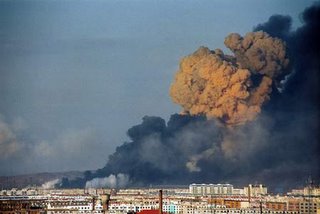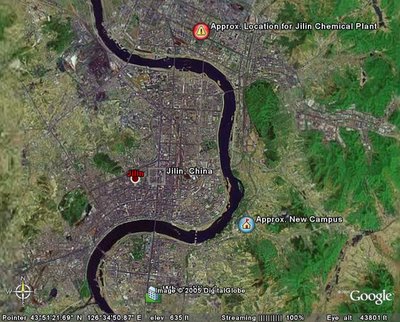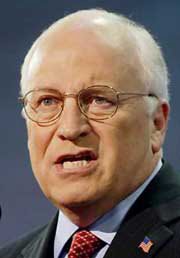
Print this page
John Mearsheimer: The rise of China will not be peaceful at all
18nov05
THE question at hand is simple and profound: will China rise peacefully? My answer is no.
If China continues its impressive economic growth over the next few decades, the US and China are likely to engage in an intense security competition with considerable potential for war. Most of China's neighbours, to include India, Japan, Singapore, South Korea, Russia and Vietnam, will join with the US to contain China's power.
To predict the future in Asia, one needs a theory that explains how rising powers are likely to act and how other states will react to them.
My theory of international politics says that the mightiest states attempt to establish hegemony in their own region while making sure that no rival great power dominates another region. The ultimate goal of every great power is to maximise its share of world power and eventually dominate the system.
The international system has several defining characteristics. The main actors are states that operate in anarchy which simply means that there is no higher authority above them. All great powers have some offensive military capability, which means that they can hurt each other. Finally, no state can know the future intentions of other states with certainty. The best way to survive in such a system is to be as powerful as possible, relative to potential rivals. The mightier a state is, the less likely it is that another state will attack it.
The great powers do not merely strive to be the strongest great power, although that is a welcome outcome. Their ultimate aim is to be the hegemon, the only great power in the system. But it is almost impossible for any state to achieve global hegemony in the modern world, because it is too hard to project and sustain power around the globe. Even the US is a regional but not a global hegemon. The best that a state can hope for is to dominate its own back yard.
States that gain regional hegemony have a further aim: to prevent other geographical areas from being dominated by other great powers. Regional hegemons, in other words, do not want peer competitors. Instead, they want to keep other regions divided among several great powers so that these states will compete with each other. In 1991, shortly after the Cold War ended, the first Bush administration boldly stated that the US was now the most powerful state in the world and planned to remain so. That same message appeared in the famous National Security Strategy issued by the second Bush administration in September 2002. This document's stance on pre-emptive war generated harsh criticism, but hardly a word of protest greeted the assertion that the US should check rising powers and maintain its commanding position in the global balance of power.
China - whether it remains authoritarian or becomes democratic - is likely to try to dominate Asia the way the US dominates the Western hemisphere.
Specifically, China will seek to maximise the power gap between itself and its neighbours, especially Japan and Russia. China will want to make sure that it is so powerful that no state in Asia has the wherewithal to threaten it. It is unlikely that China will pursue military superiority so that it can go on a rampage and conquer other Asian countries, although that is always possible.
Instead, it is more likely that it will want to dictate the boundaries of acceptable behaviour to neighbouring countries, much the way the US makes it clear to other states in the Americas that it is the boss. Gaining regional hegemony, I might add, is probably the only way that China will get Taiwan back.
An increasingly powerful China is also likely to try to push the US out of Asia, much the way the US pushed the European great powers out of the Western hemisphere. We should expect China to come up with its own version of the Monroe Doctrine, as Japan did in the 1930s.
These policy goals make good strategic sense for China. Beijing should want a militarily weak Japan and Russia as its neighbours, just as the US prefers a militarily weak Canada and Mexico on its borders.
What state in its right mind would want other powerful states located in its region? All Chinese surely remember what happened in the 20th century when Japan was powerful and China was weak. In the anarchic world of international politics, it is better to be Godzilla than Bambi.
Furthermore, why would a powerful China accept US military forces operating in its back yard? American policy-makers, after all, go ballistic when other great powers send military forces into the Western hemisphere. Those foreign forces are invariably seen as a potential threat to American security. The same logic should apply to China.
Why would China feel safe with US forces deployed on its doorstep? Following the logic of the Monroe Doctrine, would not China's security be better served by pushing the American military out of Asia?
Why should we expect the Chinese to act any differently than the US did? Are they more principled than the Americans are? More ethical? Less nationalistic? Less concerned about their survival? They are none of these things, of course, which is why China is likely to imitate the US and attempt to become a regional hegemon.
It is clear from the historical record how American policy-makers will react if China attempts to dominate Asia. The US does not tolerate peer competitors. As it demonstrated in the 20th century, it is determined to remain the world's only regional hegemon. Therefore, the US can be expected to go to great lengths to contain China and ultimately weaken it to the point where it is no longer capable of ruling the roost in Asia. In essence, the US is likely to behave towards China much the way it behaved towards the Soviet Union during the Cold War.
China's neighbours are certain to fear its rise as well, and they too will do whatever they can to prevent it from achieving regional hegemony.
Indeed, there is already substantial evidence that countries such as India, Japan, and Russia, as well as smaller powers such as Singapore, South Korea and Vietnam, are worried about China's ascendancy and are looking for ways to contain it. In the end, they will join an American-led balancing coalition to check China's rise, much the way Britain, France, Germany, Italy, Japan, and even China, joined forces with the US to contain the Soviet Union during the Cold War.
Finally, given Taiwan's strategic importance for controlling the sea lanes in East Asia, it is hard to imagine the US, as well as Japan, allowing China to control that large island. In fact, Taiwan is likely to be an important player in the anti-China balancing coalition, which is sure to infuriate China and fuel the security competition between Beijing and Washington.
The picture I have painted of what is likely to happen if China continues its rise is not a pretty one. I actually find it categorically depressing and wish that I could tell a more optimistic story about the future.
But the fact is that international politics is a nasty and dangerous business and no amount of goodwill can ameliorate the intense security competition that sets in when an aspiring hegemon appears in Eurasia.
That is the tragedy of great power politics.
John Mearsheimer is professor of political science at the University of Chicago and the author of The Tragedy of Great Power Politics (W.W. Norton, 2001).




